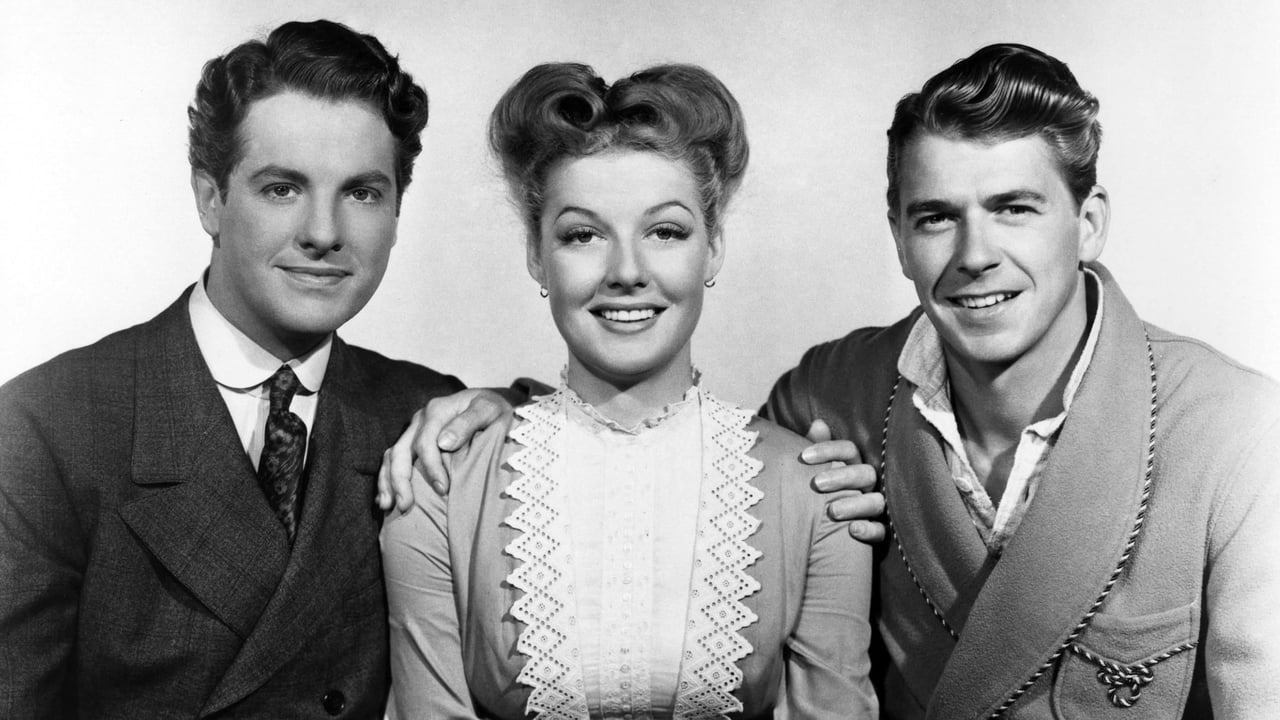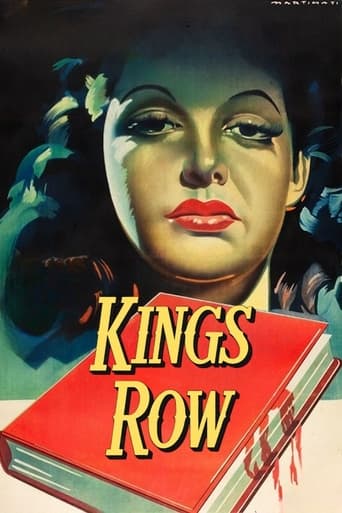

Amazing soap opera. One of the best of its kind. I'm not a big fan of soaps in general and I rarely rate them high. It's a testament to how good this is that I give it such a high score. The story is long as it traces the lives of two men (Robert Cummings, Ronald Reagan) in the town of Kings Row from childhood through trials and tribulations as adults. Cummings is the respectable, dependable one and Reagan the wild, reckless one. The film is probably best remembered today as Reagan's finest performance (and it is). Cummings is good, as well. Better than he's given credit for since his character is more steadfast and therefore doesn't get the meatier scenes that Reagan does. He does get some, though, and excels at them. Top-billed Ann Sheridan, lovely as always, doesn't appear until halfway. She plays Ronnie's love interest and is excellent in an emotional role. Her chemistry with Reagan was always good and never better than here. The supporting cast is made up of distinguished veteran actors like Claude Rains, Maria Ouspenskaya, Harry Davenport, Judith Anderson, and Charles Coburn in a surprisingly dark role. The only slight casting fault the film has to speak of is Betty Field. She plays her character with the usual overwrought excesses so many actors then and now bring to roles of mentally disturbed people. It's not a terrible performance. It's just so much more melodramatic than the rest of the cast that it makes her stick out. Fine cast with a juicy story and superb direction from Sam Wood. Oh, and that Erich Wolfgang Korngold score is wonderful. This is definitely a classic film you have to see.
... View MoreI believe that many of us, in our journeys through life, seek nothing more than to retrieve the lost innocence and safety of our childhood. It is a retreat from the cruelties and battles of adulthood. It's not necessarily the physical return to our childhood home - that's usually not possible, or even desirable - but a rediscovery of the home that exists somewhere in our hearts and our spirits. This is a prevailing theme in much of cinema. In "The Wizard of Oz" Dorothy realizes that everything she ever really wanted is back home in Kansas, and Scarlett makes the long journey back to her beloved Tara in "Gone with the Wind". Often home is associated with family. In "The Color Purple" all Celie wants is her sister, whom she hasn't seen since her childhood long, long ago. The final image in that film is the two grown sisters playing the hand-clapping game they once played as children.Then there is the magnificent "Kings Row" which says that, yes, we can go home again, and that things that turned bad can be put right. It is a powerful reverie of a movie and it had me in tears. The story is about several children in a small town who grow up to be adults. The lives they had are ruptured and they are beset by the trials and tribulations of adulthood and failing dreams. The movie is about that extra little bit of growing up they have to do in order to become the people they were meant to be. The challenges they face are brutal, and some of them don't survive. Those that do get to go home again. In the process of telling the story the movie celebrates honour, perseverance, courage, fairness, friendship, true love and the triumph of the human spirit. It shows us these virtues in action. It invites us to look, and it says: "This is what courage looks like." Or: "This is what love looks like in practice." We all need examples to show us the way. "Kings Row" is very much a parable, with dualistic symbols solidly in place - the two friends with opposite personalities; the two children's birthday parties, where one child is popular and the other isn't; the two real estate acreages; the two sides of the train tracks; the two households, early on, one where life is nurtured, the other where it is snuffed out. It's also the earliest movie that I, personally, have seen which depicts mental illness and psychiatry with any kind of detail and balance.This movie has one of the best opening chapters I've ever seen, introducing, with clarity and precision, all of the main characters as children and the nexus that will play out later in the story. Although the story covers a lot of time and dramatic territory I never felt that the movie was rushed or pared down. Every scene is remarkably efficient in the way it conveys information and dives right into the dramatic and emotional crux of the moment (the letter-writing segment is particularly brilliant), and every scene segues naturally into the next. The final two scenes, in one of which Parris recites part of William Henley's poem "Invictus", lift the movie into a kind of delirium. By the end I experienced, not exhaustion, but exhilaration by having gotten to know these people so well and having shared in their joys and sorrows. This is rare. In the end, the characters are so well defined that I wouldn't change a single performance by a single actor. All this AND the rich and detailed cinematography of James Wong Howe and the glorious, evocative music of Erich Korngold (the moment I heard the first chords I recognized him as the composer for "The Adventures of Robin Hood"). It's Warner Bros. all the way - bold and brassy. This is the kind of movie that provokes people to say, "They don't make 'em like this anymore." Old or contemporary, "Kings Row" stands alone. It is a wonderful movie.
... View MoreMany people have already written reviews of this notable film, so I'll skip the plot summary. Most of the reviews are extremely positive. I'm afraid I can't be as laudatory, though I did enjoy the movie and it prompted me to write this.There are some really fine acting performances. Unlike some, I like Robert Cummings. Yes, he is a bit "one note" as someone wrote, but I think that makes sense. Cummings has accurately portrayed a believable personality. Yes, I agree that Ronald Reagan was excellent. He almost becomes the lead role, and that's part of the problem with this movie. Ann Sheridan I would just say was good, not excellent. She does not deserve to have top billing in this movie. Maybe she was the best known star of the three main actors at that time, and she was given top billing for that reason. Betty Field as Cassandra was good, but overacted a bit in a difficult role. Claude Rains was excellent, as usual.Two other actors deserve mention, even though they had lesser roles. I thought that the actress who played Louise (Nancy Coleman) was very convincing. And I thought the performance of Henry Davenport as Skeffington was remarkable. He really seemed to be a completely authentic lawyer from the 1890s. It's hard to believe that that was someone acting.The basic situation and plot were intriguing. Sounds like the novel would be a good read. But the movie disappoints in several ways.First, it is disjointed. Too many scenes happen quickly or end abruptly. For example, there is a scene about half way through where Parris and Duke are reading a journal of Dr. Tower, soon after someone important dies (don't want to get too specific here). Suddenly Parris says, "but I'm tired." Duke immediately jumps up and says "I'll get the light." He blows it out and they leave. That's just unreal. It's too abrupt. It's jarring. This sort of thing happens again and again.Second, a major love interest of one of the main characters is introduced with only about 20 minutes to go. That is very awkward and off-putting. A veritable Deus ex machina.Third, the movie builds up a major romance and conflict between Parris and Cassandra, only to have it suddenly resolved barely half way into the movie (again, don't want to get too specific). Really, the movie should have ended there. It's as if it were really two movies, parts I and II. It would have been better as two.Fourth, the character of Randy, played by Ann Sheridan, is very briefly in the beginning of the movie as a child, then abruptly (there's that word again) reappears about half way through the movie and becomes a major character.Fifth, comparatively minor but still jarring, the actresses playing Cassandra (Field) and Randy (Sheridan) looked amazingly alike. Maybe it would not have been so in color, but in black and white, I was astonished when Sheridan abruptly appeared in the middle of the movie and seemed to be Cassandra! Was this planned by the director? So I appreciate the basic story. It's very creative. I appreciate the fine acting. But with so many flaws, I can rate it no higher than 7.henry
... View MoreI just watched this excellent melodrama two nights and was very impressed with it all round. Superb acting, gripping plot, and a memorable Korngald score.It reminds me heavily of Peyton Place, with the idyllic town hiding an dark underbelly of secrets. I understand that much of the original novel had to be watered down due to the Code, but the film still manages to touch in many subjects virtually taboo in the 40's. Pre-marital sex (the tortured Cassie and Parris' embrace and fade out to Korngald's score and the lashing storm), medical sadism, madness. The book apparently also touches on father-daughter incest.I guess this is Parris Mitchell's story, and his coming-of-age, but it could also be Drake McHugh's story. In a way, Drake is more sympathetic than Parris. Parris is almost unbelievably good, while we can relate more to Drake.We have three doctors in this tale, who all (at least to me) make the crucial mistake of mixing personal feelings with medical practice. Parris is the only one who overcomes this.I find it interesting that Warners cast three actors virtually untested in dramatic films for the three central roles in this major release. Ronald Reagan is especially good in what would have to be his best film performance. He never came close to matching his work here again. His work here was ceryainly worthy of an Oscar nomination. Cummings is an actor I have grown to like more every time I see him in something new-- he was capable of strong dramatic work in this, and films like "Black Book" and "The Lost Moment". But it is Ann Sheridan who holds the film together in the second half.But the whole cast is impressive. Charles Coburn, usually lovable, is truly frightening as the sadistic doctor. Judith Anderson normally leaves the audience trembling in her eerie wake, but here she is effectively silenced by her monstrous husband. Nancy Coleman and Betty Field both give affecting, disturbing portrayals of daughters driven mad by dominance and repression. Maria Ouspenskaya is touching as Parris' beloved grandmother. Claude Rains is mysterious. And Kareen Verne is refreshing as Parris' eventual love.Sam Wood, a very competent director, leads us through this nostalgic tale with flair. A wonderful film, 10/10.
... View More